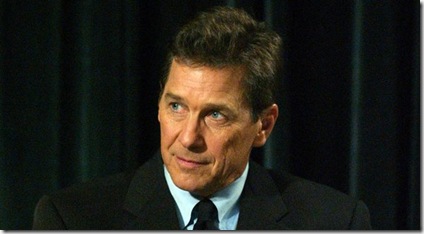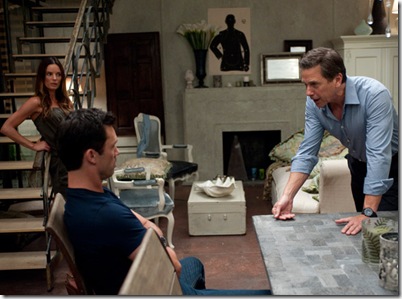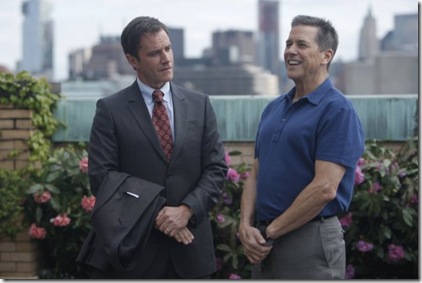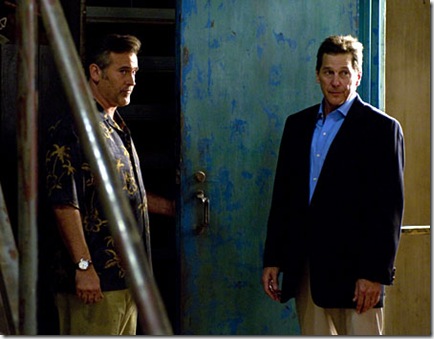Over the last few years, Tim Matheson, best known for playing Eric in the original Animal House, has become a fixture on USA Network shows. Besides directing episodes of Psych, Burn Notice, White Collar and Covert Affairs [where he directed the pilot, thus setting the tone for the series], Matheson has also guest starred as arrogant bank robber Edward “The Architect” Walker on White Collar and recurred as the charmingly dangerous [or is it dangerously charming?] ex-spy/freelance mercenary, Larry Sizemore over five episodes [so far] on Burn Notice. Little known fact: Matheson is big on Asian films!
I had the great good fortune to take part in a teleconference Q&A session with the former voice of Jonny Quest [yes, Matheson has done some legendary work] where, because of an unusually small turnout, I was able to ask more than usual couple of questions. Thanks to Matheson’s energy and enthusiasm, it was one of the most enjoyable interview experiences I’ve ever had.
My first question for you, in finding out that you’ve done all of these USA Network shows, do you approach directing each episode differently, like say, the Covert Affairs premiere versus what we saw in White Collar?
Tim Matheson: Oh, totally. And great question, Matt. And first off, I’d just like to say hi to everybody. I’m so happy to be here and talking about my favorite shows that I get to work on and my favorite network.
With Covert Affairs, there’s two separate things. When you come into a show like White Collar or Burn Notice, you are coming in as a guest in their house and you really just want to give them an episode that’s been established by their pilot director and in the mold of the shows that they have already established, and that was the case with White Collar and with Burn Notice and Psych, the shows that I’ve done prior.
And then Covert Affairs was the first time I’d ever done a pilot, and because I sort of had a good rapport and understanding with USA about the kinds of shows they do and the tone of the shows, they offered me the opportunity to direct that pilot, and it was thrilling and exciting for me to get to set the look and the tone of the show, and with such a wonderful cast. I was very pleased with how it all turned out, and I must say, just the opportunity to work with Doug Limon, David Bartis and the guys over there at their company. It was a tremendous opportunity and it was a great script and I just had a ball creating the world that they all operated in and it was a real treat.
It was actually a thrill to watch, too. I was really happy to see you on board with it. So, moving on to the Comic-Con, I have to ask, have you ever been to Comic-Con before? If not, what are your expectations, or if you’ve been, what kind of memories do you have?
Matheson: I’ve never been. You know, I’m a big comic book fan. As a kid I used to collect them until there was a horrible mudslide in Hollywood and I lost my collection, but I was also at an early age the voice of Jonny Quest; it was a cartoon; so I am kind of a latent fan boy. So I’ve always followed it, but never been there and I’m just very excited to get down there.
I don’t know what to expect. I think I’m as much of a fan as a lot of the attendees, so I’ve scheduled some time for myself just to wander around and sit in on some things, and I know that—I think that Simon Pegg is going to be there and the guys with Scott Pilgrim are going to be there, and I’m excited to see anything and everything about that. But I just want to hang around the place and see what’s happening.
Since you’re doing both acting and directing, do you consider yourself—I mean, if you just had to peg yourself in one word, would you be more an actor or a director?
Matheson: I think at the moment—that’s so hard. I think right now I’m more of a director and just in a certain way it sucks up more time because you’ve got to prep a show and then shoot it and then post it. Whereas as an actor, you prep on your own and then you just show up for the production of it, the shooting, and then you’re done. So it’s shorter and sweeter.
Equally rewarding, if the part’s really good, but the rewards from directing; especially directing something like Covert or when I did the pilot for The Good Guys for Matt Nix on Fox it was—it’s really a chance to be wholly creative. As an actor, you’re a member of the orchestra, even if you are first violin. But as the director, sometimes you are the conductor and sometimes the composer; you help the composer with certain passages, perhaps, shall we say.
And so it’s totally enveloping; directing. And acting, if it’s a great part, is equally as enveloping. One’s a performance art, one’s not, and so there’s total distinction and I’m just thrilled that I can do both.
I like your analogy with the music. So, my other question is a follow-up. So far you’ve been sort of not tied down to any of these shows. You’ve been working on them, moving around and, as you say, directing or acting here and there. If you were offered, on a regular basis, to be tied down just to one of the shows, would you be interested in that?
Matheson: Yes. I mean, I think that with the right people—the trick is to work with the right people, and in that situation, with talented people, yes. I decided a few years ago that after I’d sort of gotten my sea legs and figured out—because I think episodic is the best film school there is, and to go from show to show as a freelance director is the best training you can get.
But at some point I said, “You know, I only want to work with the people that I like, that are good, nice people and fun people, and value what I do.” And everybody’s got different expectations and likes and dislikes. So, if there was a situation that wanted me to participate on a bigger level? Yes, that’d be fun. That’d be great.
Now, you’ve worked steadily as an actor from the time that you were a kid, so I’m wondering how did you become involved in directing?
Matheson: Well, you know the oddest thing is I always wanted to be a director, and there were periods—I made films when I was a kid, shot them on 8-mm, I shot them on video. I tried to get into film school on a couple of occasions, and what usually happened was that a good acting role would come up and I’d drop everything and just go off and do it, and then that window of opportunity would close and I’d just—honestly, I never got back to it.
In the mid 80s, I think I produced a movie called Blind Fury for Tristar, and I sort of got bitten by the bug, and so I just dual-tracked it; I kept producing and directing, ultimately directing on television movies and I’ve always wanted, always been fascinated by that and love it, and it’s so fulfilling to get an opportunity for where my thoughts and feelings about the way things should to be done sort of parallel the way USA feels that they should be done and to get on shows where they appreciate what I bring to it. It’s a great convergence.
As a director, you’ve become pretty involved with USA. Tuesday, for example, as mentioned, you did both shows and so the evening was essentially a Tim Matheson double-feature.
Matheson: Sorry about that. [laughs]
I’m wondering how did you become involved with USA and how do you feel about being seen now as a master of their “blue sky” style?
Matheson: Thank you. After I’d done it a couple of years—I’d done a lot of procedural stuff and a lot of really good procedural cop shows on television like Cold Case and Third Watch and Without a Trace, and I’d had some really good success with those. But I just said—you know, after I got through a couple of years and I just wasn’t having a lot of fun with it, and I wanted to focus more on comedy. And I was fortunate enough—Mel Damski over on Psych, it was very fortunate—was very generous and invited me to come over, and I just said—it just felt like home.
To work with James Roday and Dule Hill who I knew from The West Wing, and I had such a good time. And it’s so much fun to go to work and laugh and work with funny people, and people—and it was more my sensibility. And I mean, I love action-adventure, and I always wanted to do comedy-action movies; action-comedy movies, like Mr. and Mrs. Smith.
So it just fit perfectly into my desire to that, and going from Psych to Burn Notice and then to Covert Affairs; it’s just opened a lot of doors for me because it was a perfect fit and it came at the right time and I was just very excited and happy to be there.
What responsibilities do you feel you have as a director with establishing a show versus coming in and just directing an episode?
Matheson: Great distinction. When you come in and do a show that’s already on the air and the look has been set, then my obligation and my function is to distill what that is, and to give them a version of that with some special topspin that maybe you bring to it.
I love working with actors and perhaps I’m good with actors because I am an actor and I appreciate what they do and I try—I’m there to help. I’m there to help them and I’m there to help the writers. When you come in as a pilot director, then I serve the writers first to try and find out and distill what’s the heart of the show, and then use the actors and support the actors to get to that part in their characters, and then use the camera to help tell the story so that the actors don’t get caught acting, and it sweeps the audience up in it and hopefully it will be over before they realize it and it will leave them wanting more.
Excellent. And whenever I’m either watching TV or a movie, actually your name or James Widdoes or Peter Riegert—It’s like, welcome home. Would you ever want to collaborate with these Delta brothers again on another project?
Matheson: Any time, anywhere. I love those guys, they’re good friends of mine and Jamie is a wonderful director in his own right. And Bruce McGill—
Everything you see on tv has his name on it.
Matheson: Yes, I know. And Bruce McGill is a wonderful actor. He’s in this new TNT series and was the best man at my wedding, so yes. We’re all still very close.
Now, you’re a fan favorite on Burn Notice as Larry Sizemore. You’ve just had a guest appearance on White Collar. I wanted to know what type of character would you like to play on Covert Affairs?
Matheson: A double agent. Anything to work with Piper. I just was so—I’m such a fan of hers [Piper Perabo]. She’s just the most talented, cooperative, creative actress I’ve worked with and she brings so much that it was—she was just great. And so was Chris Gorham, all of them were, but especially Piper. Anything that had a lot to do with her, I would be thrilled.
Next, can you talk about how your acting background helps you with directing episodes of the three shows?
Matheson: Yes. I understand, I think, the problems, maybe, of the actors a little better than a lot of directors. And you know another great thing about being an actor was I’ve been—and especially as a kid actor; all my life I’ve been an actor –I’ve been on a million sets and I’ve worked with and seen a million directors; good ones, bad ones, mediocre ones, middle, and great ones, and most other directors have not had that opportunity, because most other directors don’t go on other directors sets. They just don’t feel comfortable there. That’s my experience, I’ve seen that. I love going on other directors sets because I can always learn something.
And as an actor, I sometimes would give a great performance, or what I thought was like, “Wow! I nailed that!” And then I’d go see the film and I’d just realize, “Wow, it wasn’t well-directed because the camera wasn’t in the right place, it just didn’t look good.” And then I’d say, “Wow. Sometimes I didn’t do the best work I’d ever done, but it came across well because it was well-directed.” So I just want to provide the actors that I get to work with the best support and put the camera in the right place that emphasizes and enhances their performance, and create an environment where they can do their best work.
And that’s my job. You’re sort of like the coach on the sidelines at a football game with a playbook, and you just talk to them and say, “Well, you could try this, you could do this, or what do you think?” And any way they want to work is fine with me. I don’t have one particular way of working so I’m just there for the writers and the actors, to get the best out of everything.
So when you have an acting gig, in a sense, you’re like a double agent because you get to watch the director, right?
Matheson: That’s right. And I realized really early on, “Should I pay any attention to this guy?” But you know what? I learned something from Donald Sutherland when I was younger. He said, “I give myself totally to the director on every job I do, and sometimes to great effect and sometimes not, but you really ultimately don’t have control. You have control over what you do, but you have no control over anything else, so why even pretend you do?” And I thought, coming from Donald, who I think is one of the finest actors alive, I took that to heart. And so I just give myself to the director’s visions that I work for.
When you joined the White Collar crew, you directed and acted in the same episode. What is it like switching between actor and director?
Matheson: I was more nervous on White Collar because it was the first time I had done the show as a director, and so I was a little focused on that, and you’re trying to balance—as an actor, you really want to stay inside the scene, and as a director, you’re totally outside of it observing everything and making adjustments.
So I was a little nervous, and the first day that I acted, I would say that it was a little rocky, maybe, for me. I don’t think—with the way everything cut together, it worked well, but it was not the most comfortable day for me. But it all worked out. I love their crew. They’re so supportive and so helpful and Russell Lee Fine, the cinematographer, is a true artist, and he was very helpful to me.
I find somebody on the set; either the producer or the director; there were a couple of people on this show. But Russell was great, and Jeff King, the producer/director on this show, was very helpful to help me; guide my performance.
Great. And now that you’ve been in a few, been involved in all these USA Network shows, will you be appearing in any other series, or is there one that you specifically—you really, really want to be in the show as a character?
Matheson: Gosh. I never acted in Psych. I just think James Roday is one of the most talented actors around, and having directed him and watched him, I just was knocked—I’m always flabbergasted by how easy he makes it look. So he’s a performer that I would like to work with at some point.
We want to know, we want to get to the bottom of what’s up with the pineapple? Can you tell us how that started and what the deal is?
Matheson: At some point I knew, but I forget. They just, it was one of those in jokes on Psych that just took on a life of its own, and now it’s a game between Easton and Steve Franks, and they’ve got a Burn Notice thing going with Matt Nix and so it’s those guys; their way of winking and nudging at each other and having fun. But I’ve actually forgotten the genesis of the pineapple in Psych. I don’t know.
Also, you seem to be on Twitter a lot. So, do you feel like that’s a really valuable tool? What it is that attracts you to using Twitter?
Matheson: Well, my daughters and my wife use it a lot and I sort of felt so out of the loop—and Chris Gorham on Covert Affairs was a friend of Alyssa Milano’s, who is like the queen of Twitter, and so when I was in Covert, he sort of said, “You’ve got to get into this, man. You have to try this.”
It’s just gotten to be fun, you know? I’m always amazed and amused by who’s on, and when I can sort of listen in on Simon Pegg’s musings and John Shue, and any number of people and Rob Delaney is a comic that I follow. It’s just so fun to play with that, and I don’t think there’s much significance to it for me at all other than I just enjoy doing it.
I know you briefly touched on the Comic-Con thing, but did you happen to see the panel from last year for Burn Notice? Did you see what Bruce did?
Matheson: No.
Okay, well he was passing out money for everyone that was complimenting him. I was wondering how you were going to—he’s obviously going to be back this year. How you were going to …
Matheson: Oh, no!
The insanity of Bruce?
Matheson: Oh no, that’s just too good. You know what? I don’t think I can compete with Bruce. First off, he’s a cult favorite. He’s so great. I was just looking at Spider-Man the other day and it was a number one, and he was just so great in that. I mean, he’s great in everything he does. He’s a joy to work with. He’s the biggest ham and the most fun, and totally gets the business and understands it and understands his job as a performer, and I think if he wasn’t an actor, he’d probably be a wrestler.
You’re just going to play off him. You should probably bring some money along too, just in case anyone compliments you.
Matheson: Absolutely. I’ll check and raise him. Thanks for the tip, though. That’s great.
Yes, definitely check out the YouTube videos.
Matheson: I will.
Are you nervous at all about Comic-Con?
Matheson: No, I’m just excited. I mean, I’m a huge fan of comics period, but in anime and cult films. I’m just excited to be there and to see what I can find to drop in on and listen to as a fan, you know? I’m just going to go undercover and try and get in on the zeitgeist of it all.
I was on the Covert Affairs set and one of the producers said to me that you produced the Asian side panel at the Santa Barbara Film Festival. That seemed like a very fascinating angle. So I looked it up, and I noticed that they’ve got films like Castaway on the Moon and Mother. How did you get into that?
Matheson: You know what? I grew up in LA and had a Japanese girlfriend at an early age, and we used to go this theater called Telelebrea, that showed all the classic Kurosawa and Japanese Woman in the Dunes, and all those things. At an early age, I was heavily influenced by that as well. I mean, I was a big movie buff as a kid anyway, but got turned on to the Japanese, and then broader and broader. I used to, long before John Woo was known in America, I was a huge fan of his. And I think that the Asian cinema—On Bak and the Thai films and the Hong Kong films, even Johnnie To today—
He’s got great stuff.
Matheson: Oh my God. So I learned so much as a filmmaker from watching these guys, who I think are on the cutting edge; more independent and more, sort of, out there taking chances than American directors get a chance to now, and it allows me to bring new stuff to what I do. So it’s a win-win and fun. And also, there’s a great—Fantasia, up in Montreal, is a great festival, and it’s going on right now.
They’ve also got the—Vancouver has the Dragons & Tigers every year, too.
Matheson: I don’t know about that.
You should look at it. They’ve got about 40 or 50 films every year. It’s huge.
Matheson: That sounds great.
Yes. Anyway, how are you going along with the Art of Fighting American remake?
Matheson: I wrote a draft and then my draft was a little hard edge, Gran Torino kind of style, and then The Karate Kid came out, so it’s sort of being held back at the moment, like five years.
I can see why.
Matheson: They’re saying, “Gee, it’s not The Karate Kid.” And I said, “No, it never was.” But I’m a huge fan of Art of Fighting, and hopefully we’ll find a way to get it made. It’s a small movie, and it’s a tough movie, but it’s just a down and dirty little kind of film noir, cinema verite kind of film, and I should call it “Not the Karate Kid.”
There’s a certain style you bring as an actor to your roles on USA. I’m thinking the term charmingly dangerous adversaries might be a good description. So, what’s the key to playing quality bad guys like Larry Sizemore and The Architect?
Matheson: I just try to—well first, I’m fortunate enough to have good writers. And Jason Tracey and Craig O’Neill and Matt Nix on Burn Notice are just the best, and Jeff Eastin on White Collar, so I was fortunate to have those guys. Each show has a different style to it, and Burn Notice; you don’t know who that guy is. There’s more of a mystery to the character. On White Collar, the guy is sort of unmasked right from the start. So there’s a little difference in style there.
But it’s just—I don’t know that I approach it anywhere differently than what’s on the page, but I just try and bring some sense of reality and fun to the character, and Larry on Burn Notice—I’m actually going to go back down there, I think at the beginning of September; I’m acting in another episode, “Larry Returns”, which is going to be fun. I directed the episode right before that, so it should be a lot of fun.
Terrific. Thanks very much.



